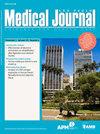中风患者死亡率的肾脏预测因素:一项横向研究的部分结果
IF 1.3
4区 医学
Q2 MEDICINE, GENERAL & INTERNAL
引用次数: 0
摘要
在大多数疾病中,肾脏因素被认为是决定预后、死亡率和住院时间的一个重要的、可控的因素。目前还缺乏明确这些因素具体作用的研究。目的:本研究旨在探讨肾因素对脑卒中患者预后(住院时间、CTI时间、谵妄、住院期间感染和死亡)的影响。方法:我们进行了一项横向研究,是队列研究的一部分。既往肾功能不全、入院情况、住院期间最高、末次肌酐、尿素及最高肌酐清除率资料。单因素分析采用T检验、Mann-Whitney检验或卡方检验,多因素分析采用logistic回归(考虑P < 0.05)。结果:获得190例患者。入院肌酐与死亡(P = 0.05)、谵妄(P = 0.07)、感染(P = 0.06)有显著性差异;最高肌酐值与住院时间、谵妄、感染(P < 0.001)、死亡(P = 0.008)有关;最后肌酐值与死亡(P < 0.001)、谵妄(P = 0.003)、感染(P = 0.01)、CTI时间(P = 0.1)有关。既往肾功能不全与死亡(P = 0.03)、谵妄和感染(P < 0.001)有显著关系。. 最高尿素对所有结局均有显著性意义(P < 0.001),包括CTI时间(P = 0.004);入院尿素致死(P = 0.01);最后尿素死亡(P < 0.001)、住院时间(P = 0.1)和谵妄(P = 0.06)。仅间隙对CTI时间无显著影响。各结果的多因素分析:最后肌酸酐至死亡(P = 0.03);最高肌酐与住院时间的关系(P = 0.02);入院时肌酐(P = 0.01)、尿素(P = 0.03)、清除率(P = 0.01)最高;肾功能不全(P = 0.009)、入院(P = 0.007)、最高(P = 0.002)和最后(P = 0.02)肌酐、最高尿素(P = 0.005)和清除率(P = 0.003)。对CTI时间无显著影响。结论:肾功能各项指标是判断脑卒中患者预后的重要指标;因此,这是我们在住院期间需要注意的一个因素。本文章由计算机程序翻译,如有差异,请以英文原文为准。
Renal predictors of mortality in stroke patients: partial results of a transversal study
Introduction: Renal factors are known as important, and a controllable factor, to define prognosis,mortality and hospitalization time in most of diseases. It still lacks studies that clarify in a specific way the role of this factors. Objectives: This study aims to elucidate the impact of renal factor in outcomes of stroke patients (hospitalization time, CTI time, delirium, infection and death during internment). Methods: We performed a transversal study, part of a cohort. Data of previous renal insufficiency,admission,highest and last creatinine and urea and the highest creatinine clearance during hospitalization. We performed univariate analysis, with T test, Mann-Whitney or chi-square tests;after, multivariate analysis with logistic regression (considering P < 0.05). Results: We obtained 190 patients. Admission creatinine was significant to death (P = 0.05), delirium (P = 0.07) and infection (P = 0.06); highest creatinine to hospitalization time, delirium, infection (P < 0.001) and death (P = 0.008);and last creatinine to death (P < 0.001), delirium (P = 0.003), infection (P = 0.01) and CTI time (P = 0.1). Previous renal insufficiency showed significance to death (P = 0.03), delirium and infection (P < 0.001). ). Highest urea showed significance to all outcomes (P < 0.001), including CTI time (P = 0.004); admission urea to death (P = 0.01); and last urea to death (P < 0.001), hospitalization time (P = 0.1) and delirium (P = 0.06). Clearance only did not show significance to CTI time.Multivariate analysis to each outcome obtained: last creatinine to death (P = 0.03); highest creatinine to hospitalization time (P = 0.02); admission (P = 0.01), highest (P = 0.01) creatinine, admission urea (P = 0.03) and clearance (P = 0.01) to delirium; renal insufficiency (P = 0.009), admission (P = 0.007), highest (P = 0.002) and last (P = 0.02) creatinine, highest urea (P = 0.005) and clearance (P = 0.003). None was significant to CTI time. Conclusion: All parameters of renal function showed to be important measures of prognosis in stroke patients; thus, it is a factor we need to be aware of during hospitalization time.
求助全文
通过发布文献求助,成功后即可免费获取论文全文。
去求助
来源期刊

Sao Paulo Medical Journal
医学-医学:内科
CiteScore
2.20
自引率
7.10%
发文量
210
审稿时长
6-12 weeks
期刊介绍:
Published bimonthly by the Associação Paulista de Medicina, the journal accepts articles in the fields of clinical health science (internal medicine, gynecology and obstetrics, mental health, surgery, pediatrics and public health). Articles will be accepted in the form of original articles (clinical trials, cohort, case-control, prevalence, incidence, accuracy and cost-effectiveness studies and systematic reviews with or without meta-analysis), narrative reviews of the literature, case reports, short communications and letters to the editor. Papers with a commercial objective will not be accepted.
 求助内容:
求助内容: 应助结果提醒方式:
应助结果提醒方式:


